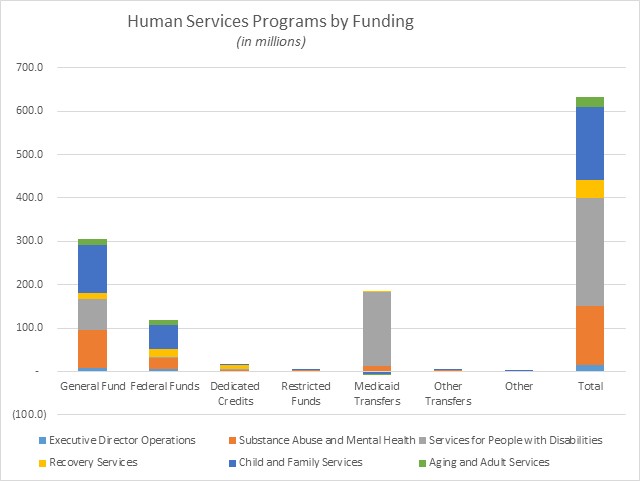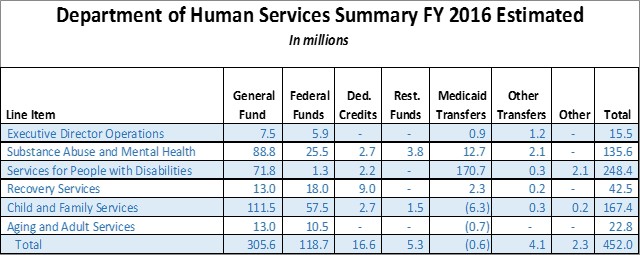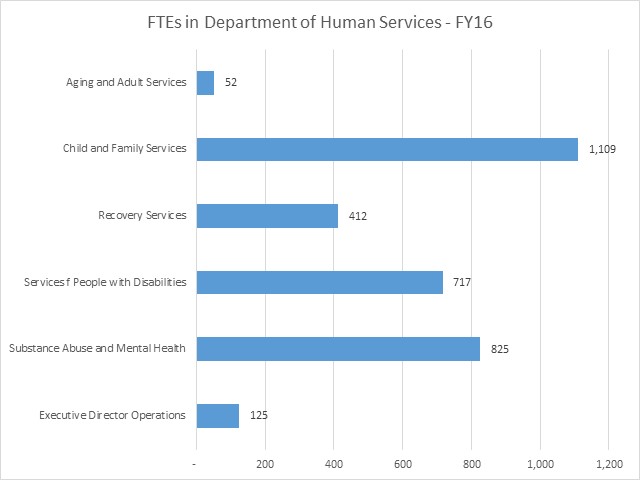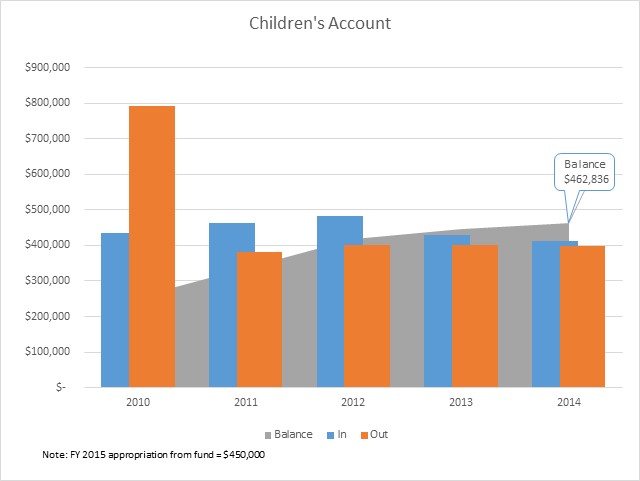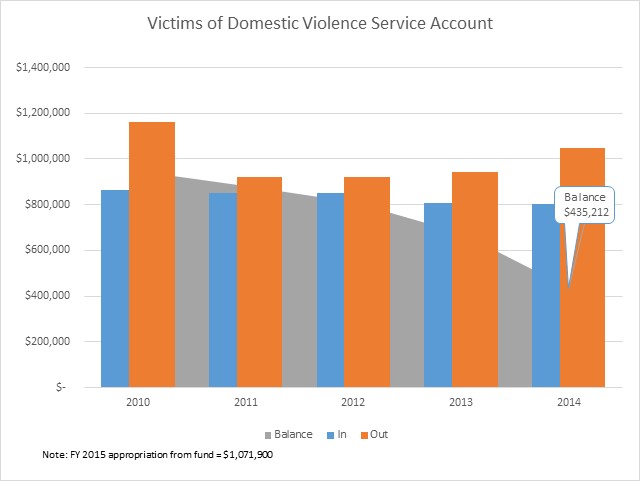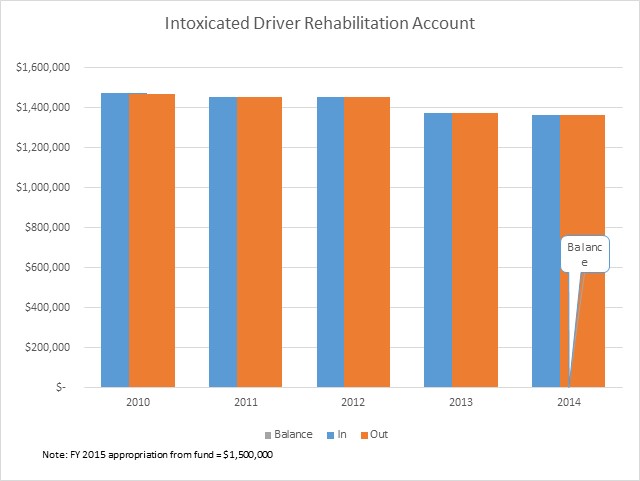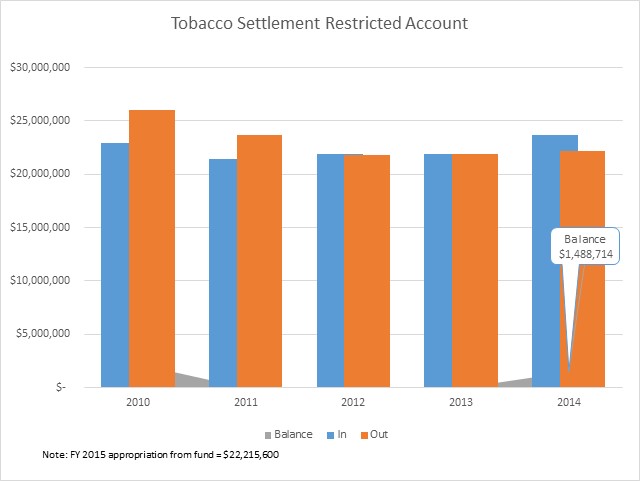HB0003: Item 88The Legislature intends the Department of Human Services and the Department of Human Resource Management provide information to the Office of the Legislative Fiscal Analyst no later than June 1, 2015 regarding the following: 1) a listing of programs throughout the Department of Human Services by agency and by program documenting where drug testing of job applicants is taking place as well as where drug testing of job applicants is not currently taking place and 2) any formal or informal state policies regarding the use or discouragement of drug testing of job applicants.
HB0003: Item 88The Legislature intends that the Department of Human Services prepare proposed performance measures for all new state funding or TANF federal funds for building blocks and give this information to the Office of the Legislative Fiscal Analyst by June 30, 2015. At a minimum the proposed measures should include those presented to the Subcommittee during the requests for funding. If the same measures are not included, a detailed explanation as to why should be included. The Department of Human Services shall provide its first report on its performance measures to the Office of the Legislative Fiscal Analyst by October 31, 2015. The Office of the Legislative Fiscal Analyst shall give this information to the legislative staff of the Health and Human Services Interim Committee.
HB0003: Item 88The Legislature intends the departments of Health, Human Services, and Workforce Services and the Utah State Office of Rehabilitation provide to the Office of the Legislative Fiscal Analyst by June 1, 2015 a report outlining how funds are distributed within the state when passed through to local government entities or allocated to various regions and how often these distributions are reviewed and altered to reflect the relevant factors associated with the programs. (1) Is the program considered a statewide program (this would include something that serves all rural areas)? a. Is the implementation of the program really statewide? If not, is there a compelling reason why? (2) Who gets the money (by county)? (3) What is the methodology for distributing the money? a. How does the distribution compare to actual need as expressed by population? i. [If distributions are not reflecting current need (as represented by population), please explain why not?] b. If not done by population, what is the reason? (4) Does statute say anything about distribution and equity for the program?
HB0003: Item 89Under Section 63J-1-603 of the Utah Code, the Legislature intends that any remaining funds provided by Item 38, Chapter 13, Laws of Utah 2014 for the Drug Courts program within the Department of Human Services' Division of Substance Abuse and Mental Health line item not lapse at the close of Fiscal Year 2015. The use of any non-lapsing funds is limited to "other charges/pass through" expenditures consistent with the requirements found at UCA 63J-1-603(3)(b).
HB0003: Item 89Under Section 63J-1-603 of the Utah Code, the Legislature intends that any remaining funds provided by Item 38, Chapter 13, Laws of Utah 2014 for State Substance Abuse Services and Local Substance Abuse Services within the Department of Human Services' Division of Substance Abuse and Mental Health line item not lapse at the close of Fiscal Year 2015. The use of any non-lapsing funds is limited to "other charges/pass through" expenditures consistent with the requirements found at UCA 63J-1-603(3)(b).
HB0003: Item 89Under Section 63J-1-603 of the Utah Code, the Legislature intends that up to $50,000 of appropriations provided for the Department of Human Services' Division of Substance Abuse and Mental Health line item in Item 38, Chapter 13, Laws of Utah 2014 not lapse at the close of Fiscal Year 2015. These funds are to be used for the purchase of computer equipment and software, capital equipment or improvements, equipment, or supplies.
HB0003: Item 92Under Section 63J-1-603 of the Utah Code, the Legislature intends that any remaining funds provided for the Division of Child and Family Services, in Item 41, Chapter 13, Laws of Utah 2014 not lapse at the close of FY 2015. The Legislature further intends that these non-lapsing funds are to be used for Adoption Assistance, Out of Home Care, Service Delivery, In-Home Services, Special Needs, and SAFE Management Information System modernization consistent with the requirements found at UCA 63J-1-603(3)(b).
HB0003: Item 93Under Section 63J-1-603 of the Utah Code, the Legislature intends that up to $50,000 of appropriations provided for the Department of Human Services' Division of Aging and Adult Services - Adult Protective Services, in Item 42, Chapter 13, Laws of Utah 2014 not lapse at the close of Fiscal Year 2015. These funds are to be used for the purchase of computer equipment and software, capital equipment or improvements, equipment, or supplies.
HB0003: Item 93Under Section 63J-1-603 of the Utah Code, the Legislature intends that any remaining funds provided by Item 42, Chapter 13, Laws of Utah 2014 for the Department of Human Services' Division of Aging and Adult Services not lapse at the close of Fiscal Year 2015. It is further the intent of the Legislature that these non-lapsing funds are to be used for client services for the Aging Waiver consistent with the requirements found at UCA 63J-1-603(3)(b).
SB0002: Item 81The Legislature intends the Department of Human Services (DHS) report to the Office of the Legislative Fiscal Analyst by September 1, 2015 regarding its efforts and progress in addressing each specific recommendation contained in the Office of the Legislative Auditor General's "An In-Depth Budget Review of the Department of Human Services" (No. 2014-09) released in October of 2014. If there are any recommendations DHS is not addressing, the Legislature further intends DHS explain why it is not addressing those recommendations. The Legislature further intends DHS identify specific savings resulting from its process improvement efforts.
SB0002: Item 81The Legislature intends that the Department of Human Services prepare proposed performance measures for all new state funding or TANF federal funds for building blocks and give this information to the Office of the Legislative Fiscal Analyst by June 30, 2015. At a minimum the proposed measures should include those presented to the Subcommittee during the requests for funding. If the same measures are not included, a detailed explanation as to why should be included. The Department of Human Services shall provide its first report on its performance measures to the Office of the Legislative Fiscal Analyst by October 31, 2015. The Office of the Legislative Fiscal Analyst shall give this information to the legislative staff of the Health and Human Services Interim Committee.
SB0002: Item 81The Legislature intends the Departments of Workforce Services, Health, Human Services, and the Utah State Office of Rehabilitation provide a report regarding each agency's highest cost individuals and possible efficiencies through coordination, early intervention, and prevention. The Legislature further intends these agencies provide a report to the Office of the Legislative Fiscal Analyst by September 1, 2015. The report shall include the following regarding high cost individuals: 1) a summary, by program, of individuals receiving services in excess of $100,000 total fund annually in any given agency, what percentage of total costs is spent on these individuals, and what the agency is doing to manage these costs in an efficient manner, 2) an assessment of these high cost individuals receiving services from multiple agencies, 3) a description of agency coordination regarding high cost individuals accompanied by a list of areas where agencies specifically coordinate on these high cost individuals, 4) recommendations regarding how best to serve these high cost individuals in least restrictive settings where appropriate and consistent with choice, and 5) recommendation on how agency efforts might better be coordinated across programs.
SB0002: Item 82The Legislature intends the Department of Workforce Services and the Administrative Offices of the Courts provide a report to the Office of the Legislative Fiscal Analyst no later than September 1, 2015. The report shall include, at a minimum: 1) a summary of efforts to improve coordination between the Drug Court program and DWS' Workforce Development Division in order to improve Drug Court success, 2) data indicating the success of the efforts including the implementation and reporting on measures of post program recidivism, and 3) any identified savings or additional funding of drug court recipients as a result of improved coordination efforts.
SB0002: Item 82The Legislature intends that the one-time General Fund appropriation of $6,400,000 to the Department of Human Services for Local Authority Mental Health Medicaid Match is provided to assist local mental health authorities for one year until they can find ways to provide their own matching funds in the future. The Legislature further intends the local mental health authorities report their plans to provide their own matching funds in the future to the Office of the Legislative Fiscal Analyst by September 1, 2015.
SB0002: Item 82The Legislature intends that the $300,000 in federal funds appropriated for Children's Mental Health Early Intervention for Children and Youth in the Department of Human Services in the Division of Substance Abuse and Mental Health line item is dependent upon the availability of and qualification for the Children's Mental Health Early Intervention for Children and Youth for Temporary Assistance for Needy Families federal funds.
SB0002: Item 83The Legislature intends the Division of Services for People with Disabilities (DSPD) in the Department of Human Services provide to the Office of the Legislative Fiscal Analyst no later than September 1, 2015 a report that includes a(n): 1) response to each specific audit recommendation found in A Performance Audit of the Division of Services for People with Disabilities (October 2014 - Audit No. 2014 - 10), 2) identification of specific efficiencies gained by DSPD through implementing the audit's recommendations, 3) estimate of savings, if any, achieved through implementation of each recommendation, and 4) measures that demonstrate effective implementation of each recommendation. The Legislature further intends the Office of the Legislative Fiscal Analyst provide the report to the Office of the Legislative Auditor General (OLAG) and that OLAG review the report in order to assess: 1) if the measures accurately demonstrate effective implementation of the recommendations and 2) the accuracy of the savings estimates, if any. The Legislature further intends OLAG report its review of the DSPD report to the Social Services Appropriations Subcommittee.
SB0002: Item 83The Legislature intends that for the building block titled "DSPD - Direct Care Staff Salary Increase," the Division of Services for People with Disabilities (DSPD) shall: 1) Direct funds to increase the salaries of direct care workers; 2) Increase only those rates which include a direct care service component, including respite; 3) Monitor providers to ensure that all funds appropriated are applied to direct care worker wages and that none of the funding goes to administrative functions or provider profits; 4) In conjunction with DSPD community providers, report to the Office of the Legislature Fiscal Analyst no later than September 1, 2015 regarding: 1) the implementation and status of increasing salaries for direct care workers, 2) a detailed explanation with supporting documentation of how DSPD providers are reimbursed, including all accounting codes used and the previous and current rates for each accounting code, and 3) a conceptual explanation of how DSPD community providers realize profit within the closed market of providing DSPD community services.
SB0002: Item 84The Legislature intends the Office of Recovery Services report to the Office of the Legislative Fiscal Analyst by September 1, 2015 regarding implementation of 2014 General Session fee increases and a detailed listing of the intended uses of the additional fee revenue with associated amounts.
SB0002: Item 85The Legislature intends the Department of Human Services' Division of Child and Family Services use nonlapsing state funds originally appropriated for Adoption Assistance non-IV-E monthly subsidies for any children that were not initially Title IV-E eligible in foster care, but that now qualify for Title IV-E adoption assistance monthly subsidies under eligibility exception criteria specified in P.L. 112-34 [Social Security Act Section 473(e)]. These funds shall only be used for child welfare services allowable under Title IV-B or Title IV-E of the Social Security Act consistent with the requirements found at UCA 63J-1-603(3)(b).
SB0002: Item 85The Legislature intends to reinvest non-lapsing state funds originally appropriated for Out of Home Care to enhance Service Delivery or In-Home Services consistent with the requirements found at UCA 63J-1-603(3)(b). The purpose of this reinvestment of funds is to increase capacity to keep children safely at home and reduce the need for foster care, in accordance with Utah's Child Welfare Demonstration Project authorized under Section 1130 of the Social Security Act (Act) (42 U.S.C. 1320a-9), which grants a waiver for certain foster care funding requirements under Title IV-E of the Act. These funds shall only be used for child welfare services allowable under Title IV-B or Title IV-E of the Act.
SB0002: Item 86The Legislature intends the Department of Human Services' Division of Aging and Adult Services use applicable federal funding reserves to provide one-time funding of $150,000 for Aging Nutrition.
SB0003: Item 129The $300,000 in federal funds appropriated for the Marriage Commission in the Department of Human Services in the Executive Director Operations line item is dependent upon the availability of and qualification for the Marriage Commission for Temporary Assistance for Needy Families federal funds.
SB0003: Item 129Under Section 63J-1-603 of the Utah Code the Legislature intends that up to $75,000 funds provided by Item 37, Chapter 13, Laws of Utah 2014 not otherwise designated as nonlapsing to the Department of Human Services - Executive Director Operations line item shall not lapse at the close of Fiscal Year 2015. The use of any nonlapsing funds is for respite care for individuals with disabilities in the Division of Services for People with Disabilities.
SB0003: Item 134The Legislature intends that the $400,000 in Beginning Nonlapsing provided to respite care for individuals with disabilities in the Division of Services for People with Disabilities is dependent upon up to $400,000 funds not otherwise designated as nonlapsing to the Department of Human Services - Division of Substance Abuse and Mental Health line item being retained as nonlapsing in FY 2015.
SB0003: Item 134The Legislature intends that the $75,000 in Beginning Nonlapsing provided to respite care for individuals with disabilities in the Division of Services for People with Disabilities is dependent upon up to $75,000 funds not otherwise designated as nonlapsing to the Department of Human Services - Executive Director Operations line item being retained as nonlapsing in FY 2015.
SB0007S01: Item 9The Legislature intends that the Department of Human Services report on the following performance measures for the Substance Abuse and Mental Health line item: (1) Local Substance Abuse Services - Successful completion rate (Target = 40%), (2) Mental Health Services - Adult Outcomes Questionnaire - Percent of clients stable, improved, or in recovery while in current treatment (Target = 70%), and (3) Mental Health Centers - Youth Outcomes Questionnaire - Percent of clients stable, improved, or in recovery while in current treatment (Target = 70%) by January 1, 2016 to the Social Services Appropriations Subcommittee.
SB0007S01: Item 26The Legislature intends that the Department of Human Services report on the following performance measures for the Executive Director Operations line item: (1) Corrected department-wide reported fiscal issues - per reporting process and June 30 quarterly report involving Bureaus of Finance and Internal Review and Audit (Target = 70%), (2) Percentage of initial foster care homes licensed within 3 months of training completion (Target = 60%), and (3) double-read (reviewed) Case Process Reviews will be accurate in The Office of Service Review (Target = 90%) by January 1, 2016 to the Social Services Appropriations Subcommittee.
SB0007S01: Item 27The Legislature intends that the Department of Human Services report on the following performance measures for the Substance Abuse and Mental Health line item: (1) Local Substance Abuse Services - Successful completion rate (Target = 40%), (2) Mental Health Services - Adult Outcomes Questionnaire - Percent of clients stable, improved, or in recovery while in current treatment (Target = 70%), and (3) Mental Health Centers - Youth Outcomes Questionnaire - Percent of clients stable, improved, or in recovery while in current treatment (Target = 70%) by January 1, 2016 to the Social Services Appropriations Subcommittee.
SB0007S01: Item 28The Legislature intends that the Division of Services for People with Disabilities (DSPD) use Fiscal Year 2016 beginning non-lapsing funds to provide services for individuals needing emergency services, individuals needing additional waiver services, individuals who turn 18 years old and leave state custody from the Divisions of Child and Family services and Juvenile Justice Services, individuals court ordered into DSPD services and to provide increases to providers for direct care staff salaries. The legislature further intends DSPD report to the Office of Legislative Fiscal Analyst on the use of these non-lapsing funds.
SB0007S01: Item 28The Legislature intends that the Department of Human Services report on the following performance measures for the Services for People with Disabilities line item: (1) Community Supports, Brain Injury, Physical Disability Waivers, Non-waiver Services - % providers meeting fiscal requirements of contract (Target = 100%), (2) Community Supports, Brain Injury, Physical Disability Waivers, Non-waiver Services - % providers meeting non-fiscal requirements of contracts (Target = 100%), and (3) People receive supports in employment settings rather than day programs (National ranking) (Target = #1 nationally) by January 1, 2016 to the Social Services Appropriations Subcommittee.
SB0007S01: Item 29The Legislature intends that the Department of Human Services report on the following performance measures for the Office of Recovery Services line item: (1) ORS Total Collections (Target = $250 million), (2) Child Support Services Collections (Target = $215 million), and (3) Ratio: ORS Collections to Cost (Target = > 5.9 to 1) by January 1, 2016 to the Social Services Appropriations Subcommittee.
SB0007S01: Item 30The Legislature intends that the Department of Human Services report on the following performance measures for the Child and Family Services line item: (1) Administrative Performance: Percent satisfactory outcomes on qualitative case reviews/system performance (Target = 85%/85%), (2) Child Protective Services: Absence of maltreatment recurrence within 6 months (Target = 94.6%), and (3) Out of home services: Percent of children reunified within 12 months (Target = 74.2%) by January 1, 2016 to the Social Services Appropriations Subcommittee.
SB0007S01: Item 31The Legislature intends that the Department of Human Services report on the following performance measures for the Aging and Adult Services line item: (1) Medicaid Aging Waiver: Average Cost of Client at 15% or less of Nursing Home Cost (Target = 15%), (2) Adult Protective Services: Protective needs resolved positively (Target = 95%), and (3) Meals on Wheels: Total meals served (Target = 10,115) by January 1, 2016 to the Social Services Appropriations Subcommittee.
